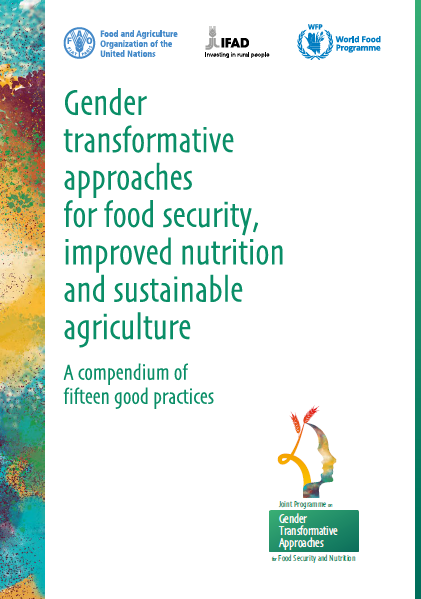
Publications
Key resources

Guidelines for measuring gender transformative change in the context of food security, nutrition and sustainable agriculture
These Guidelines include step-by-step guidance to formulate qualitative and quantitative indicators of gender transformative change to help gender experts and food security, agriculture and nutrition programme specialists in their efforts to design, implement, monitor and evaluate gender transformative interventions. They also present an overarching framework for measuring gender transformative change, including key dimensions and a socio-ecological model for identifying spheres of influence.
The Guidelines are available in English and Spanish.
The abbreviated "At a glance" version is also available in English and Spanish.

Guide to formulating gendered social norms indicators in the context of food security and nutrition
This guide will assist with formulating indicators to measure changes in gendered social norms in the context of food security and nutrition. It also offers an initial set of example indicators that programme implementers can draw on to assess social norms change in the context of food security and nutrition programmes. It draws from existing indicators from literature and programme experiences around measuring social norms, including in other sectors, and creates original indicators as well.
The Guide in available in English and Spanish.
This Compendium includes the individual templates of 15 good practices of GTAs, provides a synthesis of their main features, presents their core characteristics and describes the implementation arrangements, implementation cycle, potential results, key success factors and challenges. It also includes ideas as to how GTAs could be taken to scale.
The Compendium is available in English, French and Spanish.
A summary flyer providing brief descriptions of the fifteen good practices is available in English, French and Spanish.
 Theory of Change for gender transformative programming for food security, nutrition and sustainable agriculture
Theory of Change for gender transformative programming for food security, nutrition and sustainable agriculture
The Theory of Change (ToC) developed by the JP GTA offers a conceptual framework to assist the Rome-based Agencies and their partners in designing and implementing gender equality work with a transformational and sustainable impact. The ToC was drafted with the working hypothesis that addressing the root causes of gender inequalities and triggering a transformative change in policies, institutions and society at individual, household and community levels are essential to achieving Sustainable Development Goal 2 (zero hunger).
The ToC is available in English, French and Spanish.
Annual reviews
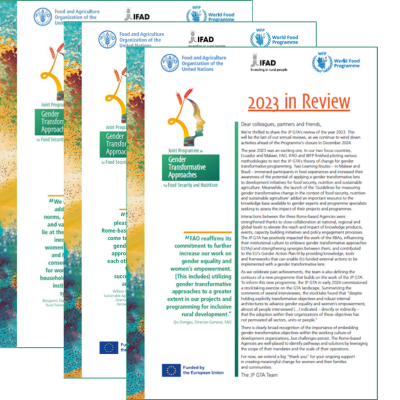
JP GTA - In Reviews
These booklets present annual reviews of the achievements of the JP GTA, offering a snapshot of the milestones, achievements and activities of the Joint Programme with links to articles, publications and event recordings. The reports are broadly structured along the four pillars of the JP GTA, with sections focusing on knowledge generation, country-level activities, capacity development and learning, and policy support and institutional engagement.
The annual "In Review" is available for 2023, 2022, 2021 and 2020.
Social norms diagnostic studies
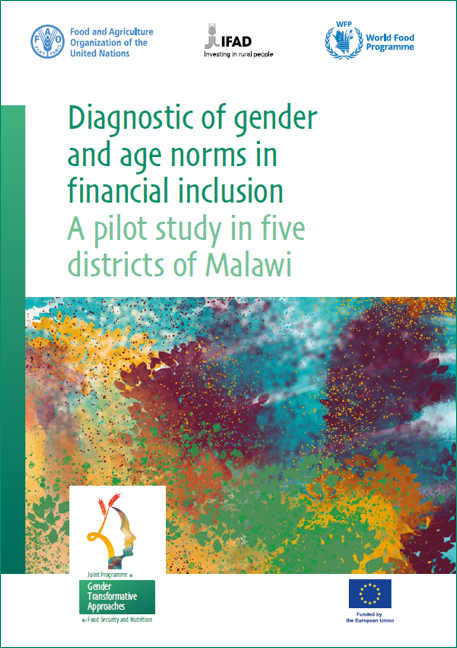
Diagnostic of gender and age norms in financial inclusion: A pilot study in five districts of Malawi
FAO, IFAD & WFP, 2024
This report presents an investigation into how social norms impact rural women’s and youth’s ability to access and use formal financial products and services in Malawi. It confirms the importance of considering social norms when designing interventions to improve women’s and youth’s economic empowerment. It also offers concrete recommendations for the development of such interventions and programming.

Diagnostic of gender norms in family farming: A pilot study in two provinces of Ecuador (in Spanish)
FAO, IFAD & WFP, 2024
This paper provides a summary of a pilot diagnostic study conducted by FAO, IFAD and WFP in two provinces of Ecuador to understand gender-related social norms that affect women in family farming in terms of their productive capacities, access to services and markets, and decision-making. The study is available in Spanish.

Social norms study in Ecuador: Good practices and lessons learned for gender equality (in Spanish)
WFP, 2022
This study capitalizes on WFP’s experience using innovative methodologies for gender norms analysis under the JP GTA in Ecuador. The study engaged more than 800 people, of which 73% women, in family farming in the provinces of Imbabura and Manabí. The study applied the Social Norms Exploration Tool (SNET) in the initial phase of development of an educational-communication strategy for social and behavioural change.
Learning Routes
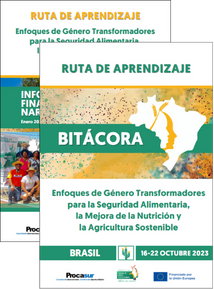
Learning Route in Brazil: Bitácora and Final Report
JP GTA & PROCASUR, 2023
These knowledge products were prepared in the context of the Learning Route on GTAs organized in Brazil in October 2023 by the JP GTA and Procasur. The ‘bitácora’ incorporates case studies visited and lessons learned, while the final report explains the six-day tour in more detail. The Learning Route was aimed at exchanging experiences and strengthening capacities to integrate GTAs in rural development projects to improve food security, nutrition and sustainable agriculture.
 Learning Route in Malawi: Thematic Introduction to GTAs and Country Study
Learning Route in Malawi: Thematic Introduction to GTAs and Country Study
IFAD & PROCASUR, 2023
This technical brief provided the context and the conceptual framework of the Learning Route "Boosting Gender Transformative Approaches in rural development interventions" which was organized by IFAD and Procasur in the framework of the JP GTA in Malawi in May-June 2023. The brief was part of the learning materials that were distributed amongst participants to support their preparation for the learning experience.
This document presents the two case studies from IFAD-supported projects in Malawi that acted as the host experiences of the Learning Route: the Programme for Rural Irrigation Development (PRIDE) and the Farmer Financial Access for Rural Markets, Smallholders and Enterprise Programme (FARMSE).
Technical studies, working papers and more

Rural women and financial inclusion
FAO, 2024
Improving the gender-responsiveness of design and delivery of rural finance interventions through innovative approaches and mechanisms is important for promoting rural women’s economic empowerment. This document, developed by FAO with technical inputs from the JP GTA, highlights practical and actionable approaches from the sector in order to guide the work of practitioners engaging at country level to pursue the above objective.

Changing rural women's lives through gender transformative social protection
FAO, 2023
This paper developed by FAO, with support from the JP GTA, aims to orient the future policy, research and programmatic work of national governments, practitioners and development partners on the adoption of a gender transformative approach to social protection to improve results on rural poverty reduction, food security and nutrition. It critically examines the scope for social protection to be gender transformative and discusses the available evidence on gender transformative impacts of social protection.
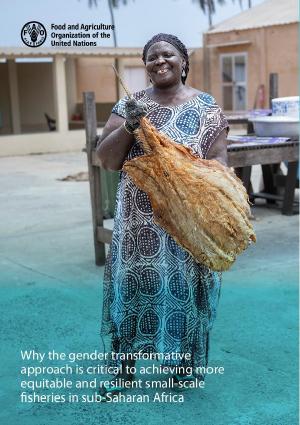
Issue brief on gender transformative approaches and small-scale fisheries
FAO, 2023
This issue brief published by FAO with technical review and inputs from the JP GTA aims to highlight the benefits of adopting the gender transformative approach in small-scale fisheries projects and initiatives in sub-Saharan Africa. It serves as an introduction for various stakeholders wishing to gain an initial understanding of how to embed GTAs in fisheries programming.

Practical guide for the incorporation of the intersectionality approach in sustainable rural development programmes and projects
FAO, 2022
This Guide was developed by FAO, with support from the JP GTA, to facilitate the development of programmes and projects with an intersectional approach, providing innovative and inclusive working methodologies that can help to identify inequalities and develop relevant solutions.
The Guide is available in English and Spanish.

Gender Norms in Financial Inclusion: Diagnostic Guidance
CGAP, 2022
Insights and findings from the JP GTA’s social norms diagnostic study in Malawi, carried out in collaboration with CARE International in Malawi, are incorporated into this guidance tool published by CGAP. The publication is the result of the ‘Social Norms Co-Lab’ facilitated by CGAP and its FinEquity community of practice, in which the JP GTA and five other funders and facilitators of financial inclusion efforts commissioned research to identify and understand gender norms that impact women’s financial inclusion.
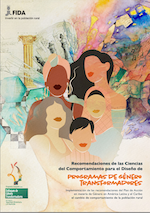 Behavioural science recommendations for the design of gender transformative IFAD programmes (available in Spanish)
Behavioural science recommendations for the design of gender transformative IFAD programmes (available in Spanish)
IFAD, 2022
The study examines how behavioural barriers and biases perpetuate the gender gap and explores how behavioural science can reduce such barriers and biases. Suggestions are presented for design and implementation of projects in Ecuador and Argentina, following the framework outlined in the JP GTA.
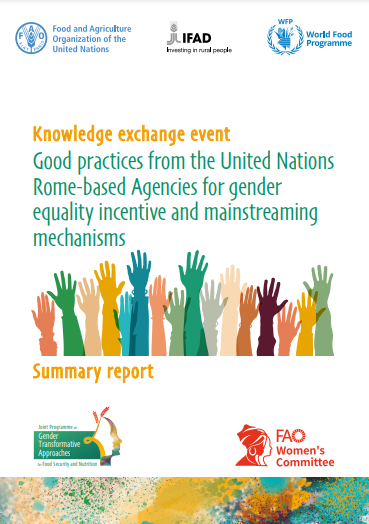 Knowledge Exchange Event: Good Practices from the United Nations Rome-based Agencies for Gender Equality Incentive and Mainstreaming Mechanisms – Summary Report
Knowledge Exchange Event: Good Practices from the United Nations Rome-based Agencies for Gender Equality Incentive and Mainstreaming Mechanisms – Summary Report
fao, ifad & wfp, 2021
This Summary Report is the outcome of a virtual knowledge exchange event organized by the JP GTA on good practices in corporate gender equality mechanisms and gender mainstreaming programmes, aimed at enhancing peer-to-peer learning and experience sharing on how to promote institutional engagement for gender equality.

Rural Women and Girls 25 years after Beijing: critical agents of positive change
fao, ifad & wfp, 2020
This document includes good practices from the members of the Inter-Agency Network on Women and Gender Equality in the thematic areas of education; food security and nutrition; health; access to and control over land and other productive resources; leadership, decision-making and public life; social protection and services; care and domestic work; GBV; and resilience in the context of climate change and fragility. The publication benefitted from the contribution of the JP GTA.





